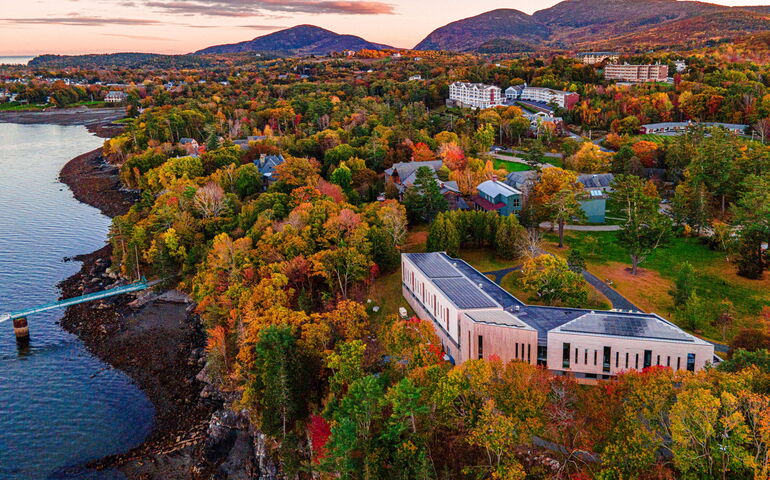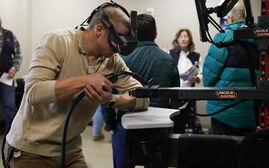Processing Your Payment
Please do not leave this page until complete. This can take a few moments.
- News
-
Editions
View Digital Editions
Biweekly Issues
- December 1, 2025
- Nov. 17, 2025
- November 03, 2025
- October 20, 2025
- October 6, 2025
- September 22, 2025
- + More
Special Editions
- Lists
- Viewpoints
-
Our Events
Event Info
Award Honorees
- Calendar
- Biz Marketplace
College of the Atlantic, nation’s top green college, seeks to support sustainability in broader community
 Courtesy / College of the Atlantic
College of the Atlantic’s sustainability actions incude construction of buildings designed to passive house principles.
Courtesy / College of the Atlantic
College of the Atlantic’s sustainability actions incude construction of buildings designed to passive house principles.
College of the Atlantic, the Bar Harbor school named the nation’s top green college earlier this month, is joining Southern Maine Community College in Portland, the University of Maine in Orono and six other colleges and universities outside of Maine to support climate action in each of their broader communities.
The nine institutions will serve as host sites for AmeriCorps’ Campus Climate Action Corps program, a new AmeriCorps program from Campus Compact, a national nonprofit organization headquartered in Boston and dedicated to the public purposes of higher education.
As a host site, College of the Atlantic will support a team of one full-time and four part-time AmeriCorps members whose goal will be to contribute to sustainability efforts on Mount Desert Island.
"We are committed to transitioning our campus off fossil fuels by 2030,” said David Gibson, COA’s director of energy. “Hosting Campus Climate Action Corps members will help us achieve this goal, and help expand our impact into the broader community to reduce energy use, carbon emissions and heating costs.”
The AmeriCorps program will host community environmental education events, conduct home energy assessments, including home energy assistance referrals, and implement low-tech home energy interventions to help advance public knowledge and increase motivation to conserve energy and reduce carbon emissions.
“It is now possible for every home to eliminate fossil fuel consumption using off-the-shelf technologies that have been proven to work in Maine,” said Gibson.
Campus Climate Action Corps members will lead community outreach to share successful practices that address climate change.
The focus is on implementing local solutions for underserved households and communities.
“To lessen the impacts of climate change and reduce human-induced carbon emissions, we need to do everything we can to mobilize higher education institutions as an important part of the solution,” said Sally Slovenski, Campus Climate Action Corps’ program director and executive director of the Maine Campus Compact.
“By leveraging the resources and expertise of higher education, there is huge potential to make a real impact on climate change.”
Ranked No. 1 nationally in the Princeton Review's “Guide to Green Colleges,” COA became the first carbon-neutral college in the U.S. in 2007 and has implemented actions such as construction of buildings designed to passive house principles.
Mainebiz web partners
Related Content

The Giving Guide
The Giving Guide helps nonprofits have the opportunity to showcase and differentiate their organizations so that businesses better understand how they can contribute to a nonprofit’s mission and work.
Learn More
Work for ME
Work for ME is a workforce development tool to help Maine’s employers target Maine’s emerging workforce. Work for ME highlights each industry, its impact on Maine’s economy, the jobs available to entry-level workers, the training and education needed to get a career started.
Learn More
Groundbreaking Maine
Whether you’re a developer, financer, architect, or industry enthusiast, Groundbreaking Maine is crafted to be your go-to source for valuable insights in Maine’s real estate and construction community.
Learn more-
The Giving Guide
The Giving Guide helps nonprofits have the opportunity to showcase and differentiate their organizations so that businesses better understand how they can contribute to a nonprofit’s mission and work.
-
Work for ME
Work for ME is a workforce development tool to help Maine’s employers target Maine’s emerging workforce. Work for ME highlights each industry, its impact on Maine’s economy, the jobs available to entry-level workers, the training and education needed to get a career started.
-
Groundbreaking Maine
Whether you’re a developer, financer, architect, or industry enthusiast, Groundbreaking Maine is crafted to be your go-to source for valuable insights in Maine’s real estate and construction community.
ABOUT
NEW ENGLAND BUSINESS MEDIA SITES
No articles left
Get access now
In order to use this feature, we need some information from you. You can also login or register for a free account.
By clicking submit you are agreeing to our cookie usage and Privacy Policy
Already have an account? Login
Already have an account? Login
Want to create an account? Register
Get access now
In order to use this feature, we need some information from you. You can also login or register for a free account.
By clicking submit you are agreeing to our cookie usage and Privacy Policy
Already have an account? Login
Already have an account? Login
Want to create an account? Register










0 Comments